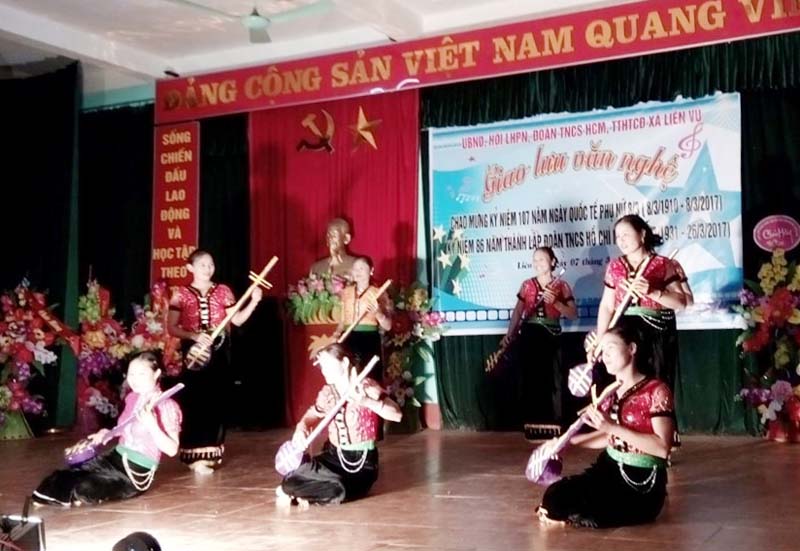
(HBO)- Currently, 100% of hamlets and streets in Lien Vu commune (Lac Son district) have a performance and gong teams. The commune has nine art cultural clubs, which are established under the decision of the Lien Vu People's Committee. It also has one cultural club named "The Youth preserves the national cultural identity" established by the Youth Union of the commune.

The performance teams of Lien Vu commune (Lac Son) perform to serve the
needs of enjoying the poeple’s spiritual culture.
The performance and the gong teams were also established in a lot of
schools in the district. Each performing
arts team has from fifteen to twenty main people. They have great passion for
singing, dancing and traditional musical instruments. The art clubs and teams
operate in the form of socialization. Activities of mass clubs and teams are
regularly maintained at village and hamlet cultural houses and integrated into
regular meetings of associations and unions. Each club and art team has its own
strengths and most of the performances are traditionally national songs and
dances. Each performance team has been invested with a mandolin and the commune
gave a set of gong to th high and the secondary schools on the occasion of the
opening ceremony of 2018 – 2019 school year for training and performance.
Ms. Bui Thi Nhien, a member of Huong Que Club, Beo Village says that Huong
Que Club was established in 2013, so far, all club members really like singing
and national musical instruments. They have the same desire to preserve and promote
the national cultural identity. A special point creating the vitality of the
movement is the passion and enthusiasm of the amateurs artists and actors for
the preservation of the traditional cultural values and the reception of the
people through performances. Besides the training and performances, the club
members also actively guide and teach folk songs and gong songs to their
children in the neighborhood. Thereby, it not only helps the performance teams
with the opportunity to perform, exchange and learn more experiences but it
also helps them with preservation and promotion of the national cultural
identity.
As a land deeply intertwined with human history and Vietnam’s millennia-long journey of nation-building and defence, Hoa Binh is often revered for its epic tales and legends.
Residents of Hoa Binh boast a rich cultural identity, reflected in their unique language, traditional attire, customs, and folk melodies – described as "sweet as honey, clear as a mountain stream.”
Lac Son district’s Vu ban town held the 2025 Truong Kha temple festival on April 12–13 (the 15th–16th days of the third lunar month). Since its revival in 2019, the festival has been organised every three years, preserving valuable intangible heritage while meeting the community’s cultural and spiritual needs.
The clothing of women reflects the culture of the Muong, Thai, Tay, Dao, and Mong ethnic groups in the northern province of Hoa Binh.
Gongs hold a special place in the cultural and spiritual life of the Muong ethnic people in Hoa Binh province. More than musical instruments, they are an indispensable part of community rituals and collective memory, echoing through generations as a spiritual thread linking the past, present, and future.
Preserving and promoting the cultural values of the Muong ethnic group has become an urgent task in the current context, as many traditional values face the risk of fading away. This effort requires not only protecting the cultural identity but also eliminating outdated customs and developing a modern cultural lifestyle, contributing to sustainable values for the Muong community in Hoa Binh province.
The Muong ethnic culture, deeply rooted in Vietnam’s mountainous north, continues to be preserved and revitalised by dedicated individuals and communities determined to safeguard their ancestral identity.



